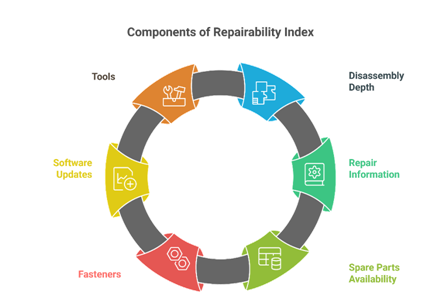Right to Repair and Repairability Index in India

- 07 Aug 2025
In News:
India has accepted the proposal to introduce a Repairability Index for electronics, aligning with the global movement to strengthen the Right to Repair. This is seen as a step towards sustainable consumption and consumer empowerment, but concerns remain about the neglect of India’s vibrant informal repair economy, which is rich in tacit and generational knowledge.
Understanding Right to Repair
- Definition: The Right to Repair ensures that consumers can repair, modify, or access affordable third-party repair services for their products.
- Global Trends:
- The European Union mandates access to spare parts and repair manuals.
- Several U.S. states have legislated consumer rights for repair.
- The principle supports UN SDG-12 (Responsible Consumption and Production).
- India’s Framework:In 2023, the Department of Consumer Affairs launched a Right to Repair portal, covering electronics, automobiles, and farm equipment.
Significance Beyond Consumer Rights
- Tacit Knowledge Systems: Informal repairers acquire skills through observation and mentorship, not formal certifications. Repair hubs like Karol Bagh (Delhi) and Ritchie Street (Chennai) embody this tradition.
- Cultural Identity: Repair is not just technical work but part of India’s jugaad culture, reflecting frugality, resource reuse, and indigenous innovation.
- Sustainability: Repair extends product life, prevents premature disposal, and reduces e-waste burden.
- Unrecognized Workforce: Informal repairers, despite their contribution to the circular economy, remain excluded from labour laws and digital policy frameworks.
Policy and Digital Gaps
- E-Waste Rules, 2022: Focus primarily on recycling while overlooking repair as the first line of defence.
- Skill India (PMKVY): Training modules remain rigid and unsuitable for improvisational, diagnostic repair work.
- AI and Digital Public Infrastructure (DPI) Policies: Emphasize structured data but ignore human-led, tacit repair knowledge.
- Education (NEP 2020): While advocating experiential learning, it fails to recognize repair work as skill education.
- Legal Support: Informal repairers lack certification pathways, formal rights, or recognition within the digital economy roadmap.
Towards an Inclusive Repair Ecosystem
- Repairability Standards: Embed repair norms in AI systems, public procurement, and hardware design.
- Expanded Right to Repair:
- Introduce product classifications by repairability.
- Ensure access to manuals and spare parts.
- Promote community repair hubs.
- Skill Recognition: Integrate informal repairers into e-Shram, and design flexible reskilling modules.
- Knowledge Preservation: Use AI tools (LLMs, decision trees) to digitize tacit repair knowledge and make it shareable.
- Policy Convergence: Collaborate across ministries — Labour (MoLE), Electronics & IT (MeitY), Rural Development (MoRD) — for a unified repair ecosystem.
